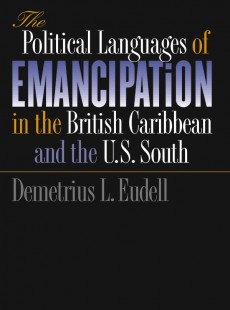
The Political Languages of Emancipation in the British Caribbean and the U.S. South
Demetrius L. Eudell
 Publisher: University of North Carolina Press
Publisher: University of North Carolina Press
Imprint: The University of North Carolina Press
Published: 04/2003
Pages: 248
Subject: History, Social Science
| University of North Carolina
Print ISBN: 9.78E+12
eBook ISBN: 9780807860120
DESCRIPTION
Eudell investigates the public policies--which addressed issues of labor control, access to land, and the general social behaviors of former slaves--used to execute emancipation. In both regions, government-appointed officials (special magistrates in Jamaica and agents of the Freedmen's Bureau in South Carolina) were crucial in implementing these policies. While many former slaves were fighting for the right to be paid for their labor and to own land, many officials came to view their role as part of a new civilizing mission whose goal was to eradicate the psychic damage supposedly caused by slavery.
Eudell concludes by examining the 1865 Morant Bay rebellion in Jamaica and the retreat from Reconstruction in South Carolina, part of the larger movement of Redemption that occurred in 1877. Both of these occurrences represented the incomplete victory of emancipation, Eudell argues, and should provoke scholarly questions regarding the persistent thesis of U.S. exceptionalism.
RELATED TITLES





